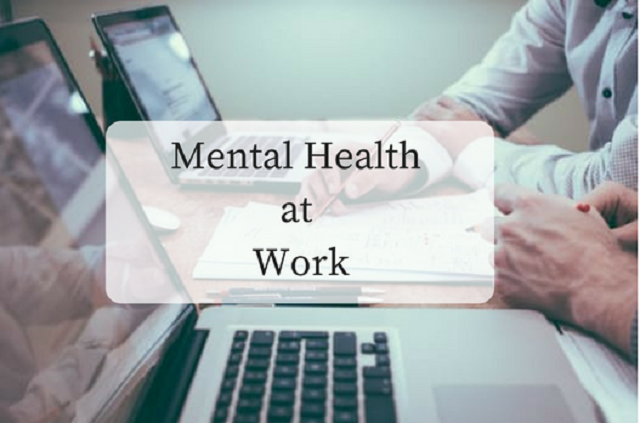Workplaces have bearing on mental health

Pastor Tawanda Mvere
During our adult lives, a large proportion of our time is spent at work. Our experience in the workplace is one of the factors determining our overall wellbeing. Employers and managers who put in place workplace initiatives to promote mental health and to support employees who have mental disorders see gains not only in the health of their employees but also in their productivity at work.
A negative working environment, on the other hand, may lead to physical and mental health problems, harmful use of substances or alcohol, absenteeism and lost productivity. Depression and anxiety disorders are common mental disorders that have an impact on our ability to work, and to work productively. Globally, more than 300 million people suffer from depression, the leading cause of disability. More than 260 million are living with anxiety disorders. Many of these people live with both. A recent WHO-led study estimates that depression and anxiety disorders cost the global economy US$ 1 trillion each year in lost productivity.
Mental health in the workplace was the theme of World Mental Health Day 2017. World Mental Health Day is observed on October 10 every year, with the overall objective of raising awareness of mental health issues and mobilising efforts in support of better mental health.
Untreated mental disorders (in employees or their family members) result in diminished productivity at work, reduced rates of labour participation, foregone tax based income, increase in workplace accidents, higher turnover of staff and increased welfare payments. Six in 10 people say poor mental health impacts on their concentration at work. It is also increasingly evident the negative role that stigma plays by decreasing the chances of people seeking proper diagnosis and treatment.
The good news is that evidence is showing that treating anxiety, depression and other mental health conditions is an affordable and cost effective way to promote wellbeing and prosperity. Employers can become agents of change. The risk factors for stress in the workplace can be modified, and an organisational climate that promotes wellbeing and creativity can be developed by targeting workplace policies as well as the needs of individual employees. Similarly, effective treatments exist for common mental disorders, and an employer can facilitate access to care to those who may need it.
Organisations can and should engage and empower people at all levels, from senior leaders and people managers to employees, to take action and foster safe and supportive work cultures. Although mental illness is experienced by a significant proportion of the workforce, it is still seen as a taboo issue. More than 70% of people with mental illness actively conceal their mental illness from others, and very many of those who conceal do so because they fear discrimination when looking for or keeping a job.
Unfortunately, there are rational, valid reasons for employees being cautious about disclosing a mental illness. Although the majority of people with mental illness want to work and this is important for recovery, people with mental illness are more likely to be unemployed than people without mental illness.
In Zimbabwe it is not rare for one to lose their job after suffering from a mental illness. Legislation which mandates equality for people with disability in the workplace in many countries covers mental health problems. However, it has not proved to be sufficient to reduce inequalities: it is striking that, when broken down by a type of disability, mental illness is the condition which is still associated with the greatest disadvantage in terms of employment rates.
Despite efforts to correct the mental illness disadvantage, stigma and lack of awareness of mental health issues in the workplace persist as barriers to equality. This lack of awareness may lead to less supportive working environments and a lack of understanding about the help and support needed by people when they do have a mental health problem. Stigma and discrimination can also influence opportunities for employment. A systematic review investigated employers’ ratings of employability: in 8 out of 10, it was found that those with a mental health problems were rated lower than those with either a physical disability or no disability.
The problem is not only one of employers’ attitudes and behavior. Public attitudes also present a barrier to equality and can have significant consequences for people with mental illnesses. Research that pooled public attitudes from several different national surveys suggests that although there is growing awareness of the effectiveness of mental health treatments, social acceptance of people with mental illness as a co-worker has not improved in the past 20 years. Despite these challenges, there is a strong economic case, not only to tackle employer stigma and lack of awareness of mental health issues, but also for those employers to make meaningful investments in mental health promotion, prevention and treatment programs in the workplace. As these issues are interconnected, reducing stigma is a key step towards achieving a healthier workplace environment.
Businesses that value the health of their employees, including their mental health and wellbeing, have specific practices and policies in place. Such companies can be small, medium, or large.
The mental health-friendly workplace
• Welcomes all qualified job applicants; diversity is valued.
• Includes health care that treats mental illnesses with the same urgency as physical illnesses.
• Has programs and practices that promote and support employee health-wellness and/or work-life balance.
• Provides training for managers and front-line supervisors in mental health workplace issues,
including identification of performance problems that may indicate worker distress and possible need for referral and evaluation.
• Safeguards confidentiality of employee health information.
• Provides an Employee Assistance Programme or other appropriate referral resources to assist managers and employees.
• Supports employees who seek treatment or who require hospitalisation and disability leave, including planning for return to work.
• Ensures “exit with dignity” as a corporate priority, should it become essential for an employee to leave employment.
• Provides all-employee communication regarding equal opportunity employment and similar topics that promote an accepting, anti-stigmatising, anti-discriminating climate in the workplace.
There are actions every employee can take to learn about mental health and wellness. Just as we can take steps to prevent a heart attack, employees can make an effort to understand the signs and symptoms of a mental health problem, and learn how to engage in prevention. It’s equally important to understand how to talk about our concerns if we feel that we need support. From becoming familiar with Employee and Family Assistance Programs employers may offer, to nurturing conversations about mental health, there are many ways employees can proactively look after their mental wellness.
Each person in an organisation has a responsibility to foster a culture of dignity, respect and inclusion. Whether you are financially strained, creatively frustrated, or just plain bored, feeling stuck in a job is unpleasant to say the least. Given how much of our time we spend at work, it is important for our physical and mental health to find a healthy, rewarding environment. Depending on your situation, you may be actively looking for new employment or just feeling bogged down by your current work. Whatever the case, there are steps you can take to make the most out of your current situation.
What are you passionate about? What do you find most rewarding? What do you consider your strengths? If you strongly prefer working with animals, the service industry may prove unsatisfying for you; whereas, a strongly extroverted person may thrive in this field. Take time to sit down and think about what it is that you want and find fulfilling. You may also want to ask those around you for opinions and support. While only you can know what you truly want, sometimes others can point out things we had not noticed about ourselves.
If you are in an unhealthy work environment or a situation that cannot be improved, your best option may be to find a new place of employment. Although it may take some time, finding satisfying work can put you at a lower risk for the dangers associated with unhealthy workplaces.
The writer is the Executive Director of Christian Counselling and Depression Trust and the Senior Pastor at Abounding Grace Ministries International. Christian Counselling and Depression Trust is a non-profit making organisation based in Bulawayo, whose primary purpose is to raise awareness on mental health disorders as well as provide Christian Counselling. For further information contact Pastor Tawanda Mvere on 0733 207 898 email [email protected]











Comments